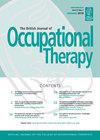探索乳腺癌和治疗后妇女的职业认同:定性研究
IF 1.3
4区 医学
Q3 REHABILITATION
引用次数: 0
摘要
患乳腺癌后存活下来的妇女人数不断增加,同时她们承受治疗后遗症的时间也越来越长。虽然人们知道治疗的效果会影响职业参与,但对乳腺癌如何影响职业认同却知之甚少。本研究旨在从职业角度揭示长期接受乳腺癌治疗的妇女的生活经历,以探讨她们如何看待自己的职业身份。本研究采用半结构式访谈法对六名女性进行了定性研究,她们都被诊断出患有乳腺癌并接受了一年以上的治疗。研究采用了反思性主题分析法来分析数据。三个相互交织的主题描述了参与者的经历。(1) "日常生活中的干扰和环境支持",(2) "能够做到 "和身份认同,(3) "做重要的和可能做的事"。研究结果显示,参与者的职业认同感得以保持。癌症治疗的影响似乎影响了与参与者职业认同相对应的职业能力,这表明在职业适应顺序上存在困难。我们的研究结果有助于理解妇女在乳腺癌和治疗后的职业身份对职业参与的挑战。本文章由计算机程序翻译,如有差异,请以英文原文为准。
An exploration into the occupational identity of women following breast cancer and treatment: A qualitative study
The number of women surviving after breast cancer is increasing, along with the length of time they are living with the after-effects of treatment. Although the treatment’s effects are known to impact occupational participation, little is known about how breast cancer could affect occupational identity. This study aims to illuminate the lived experience of women long-term after breast cancer treatment through an occupational perspective in order to explore how they perceive their occupational identity. A qualitative study with semi-structured interviews was conducted with six women, who had all received a diagnosis of breast cancer and treatment for longer than a year. Reflexive Thematic Analysis was used to analyse the data. Three intertwined themes describe the participants’ experience. (1) ‘Disruptions in daily life and Environmental support’, (2) ‘Be able to do’ and identity, and (3) ‘Doing what matters and is possible’. Findings revealed that the occupational identities of the participants were maintained. Cancer treatment effects appear to impact occupational competence that corresponded to participants’ occupational identities, suggesting difficulties in the order of occupational adaptation. Our findings contribute to understanding the challenges to occupational participation related to the occupational identity of women following breast cancer and treatment.
求助全文
通过发布文献求助,成功后即可免费获取论文全文。
去求助
来源期刊

British Journal of Occupational Therapy
REHABILITATION-
CiteScore
2.20
自引率
15.40%
发文量
81
审稿时长
6-12 weeks
期刊介绍:
British Journal of Occupational Therapy (BJOT) is the official journal of the Royal College of Occupational Therapists. Its purpose is to publish articles with international relevance that advance knowledge in research, practice, education, and management in occupational therapy. It is a monthly peer reviewed publication that disseminates evidence on the effectiveness, benefit, and value of occupational therapy so that occupational therapists, service users, and key stakeholders can make informed decisions. BJOT publishes research articles, reviews, practice analyses, opinion pieces, editorials, letters to the editor and book reviews. It also regularly publishes special issues on topics relevant to occupational therapy.
 求助内容:
求助内容: 应助结果提醒方式:
应助结果提醒方式:


